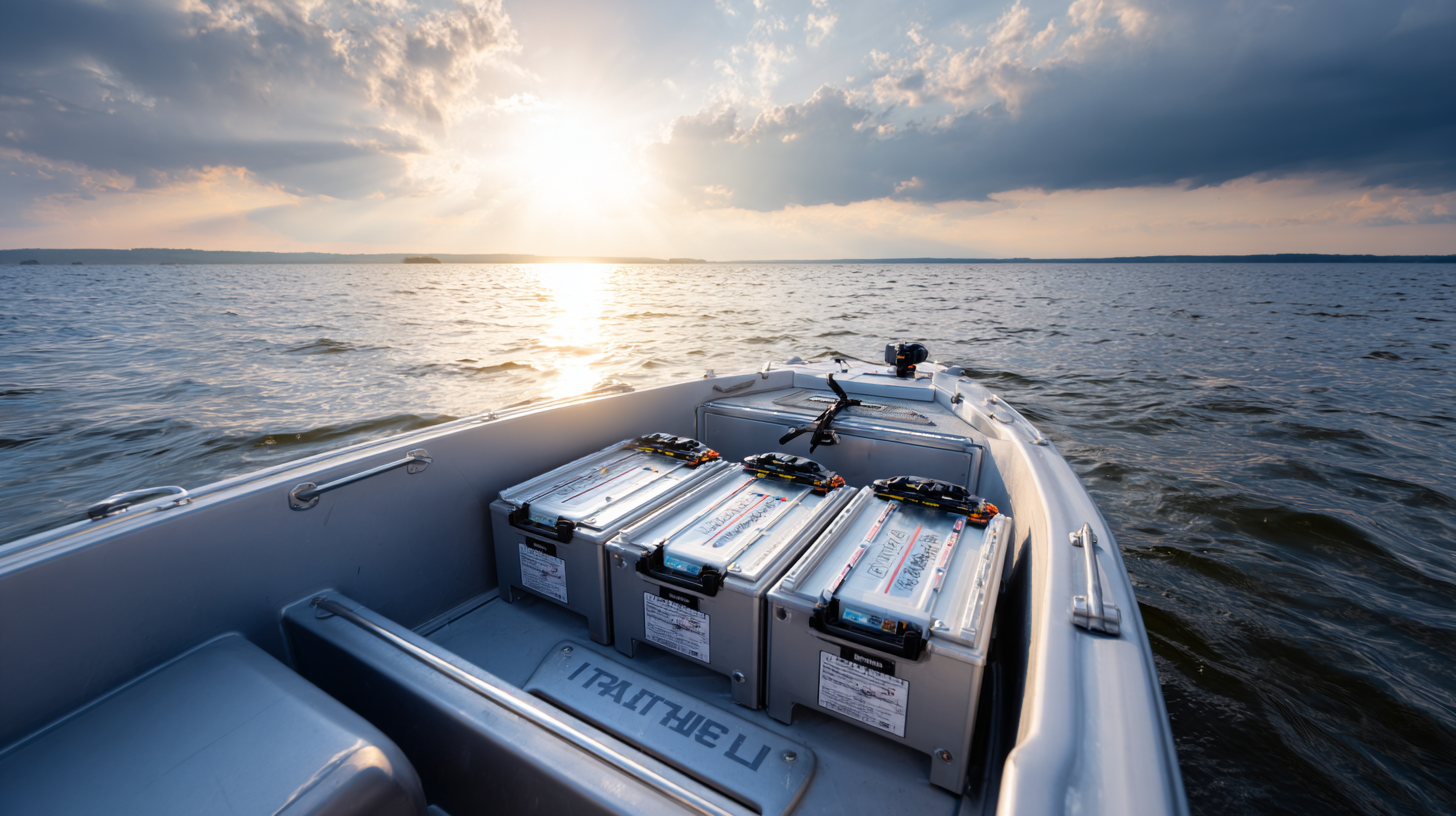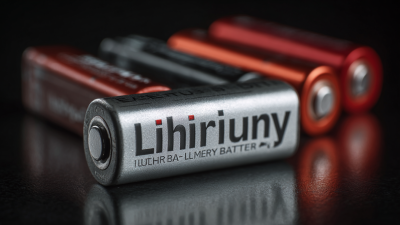Top 5 Lithium Marine Batteries for Ultimate Performance and Reliability in 2023
In the rapidly evolving world of marine technology, the demand for efficient and reliable power sources has led to a significant rise in the use of Lithium Marine Batteries. According to industry expert Dr. Emily Carter, a leading authority in marine energy solutions, "The future of maritime power lies in the efficiency and longevity of lithium batteries, paving the way for cleaner and more sustainable marine operations." As we navigate through 2023, understanding the top-performing lithium marine battery options is crucial for boat owners, manufacturers, and enthusiasts looking to enhance their vessels' performance and reliability.
Lithium Marine Batteries offer numerous advantages over traditional lead-acid counterparts, including reduced weight, higher energy density, and extended lifespans. With these benefits in mind, it is essential to explore the most advanced battery technologies available in the market today. This examination will not only help consumers make informed choices but also highlight innovations that can transform the way we power marine adventures. By diving into the top five lithium marine batteries of 2023, we uncover the cutting-edge solutions designed to meet the rigorous demands of modern boating while contributing to a more sustainable future.

Top Advantages of Lithium Marine Batteries Over Traditional Lead-Acid Technology
Lithium marine batteries have gained immense popularity among boaters and marine enthusiasts due to their superior performance and reliability compared to traditional lead-acid batteries. One of the most significant advantages of lithium batteries is their higher energy density, which translates to more power storage in a lighter package. For instance, lithium-ion solutions can typically offer up to 3000-5000 cycles, significantly outpacing the lifespan of lead-acid batteries, which generally only provide around 200-300 cycles. This longevity contributes to lower overall operational costs and less frequent replacements.
Another crucial benefit lies in the charging efficiency of lithium batteries. They can be charged much faster than their lead-acid counterparts, often achieving 80% capacity in just a fraction of the time. This rapid charging capability is essential for marine applications, where downtime can be detrimental. Furthermore, lithium batteries maintain consistent voltage levels throughout the discharge cycle, ensuring reliable power delivery for equipment and systems onboard, which is critical for safety and performance in marine environments. With ongoing advancements in lithium technology, industry experts predict even greater adoption of these batteries in various boating applications in the coming years.
Key Performance Metrics of Leading Lithium Marine Batteries in 2023
In 2023, the marine sector is experiencing a significant shift towards lithium batteries due to their superior performance and reliability. Key performance metrics such as energy density, weight, discharge rates, and lifespan are critical factors for boaters looking to enhance their vessels' efficiency. Lithium marine batteries typically offer a higher energy density compared to traditional lead-acid options, meaning they can store more energy in a smaller, lighter package. This is particularly advantageous for long-distance cruising, where weight and space are at a premium.
When selecting a lithium marine battery, consider the discharge rate, as this affects how quickly you can draw power from the battery during peak usage. Look for batteries that can sustain high discharge rates without compromising their lifespan. Additionally, check for built-in battery management systems, which help maintain optimal performance and health of the battery over time.
**Tips:** Always match your battery's specifications with your boat’s power requirements to ensure compatibility. Regularly monitor your battery's state of charge and temperature to avoid any performance issues. Finally, investing in a quality charger designed for lithium batteries will extend their lifespan and ensure safe operation.
Top 5 Lithium Marine Batteries Performance Comparison in 2023
Understanding Depth of Discharge and Its Impact on Marine Battery Longevity
When selecting lithium marine batteries, understanding the concept of Depth of Discharge (DoD) is crucial for maximizing battery longevity and performance. DoD refers to the percentage of the battery’s capacity that has been used; for example, a DoD of 50% means that half of the battery's capacity has been utilized. Lithium batteries are known for their ability to handle a deeper discharge compared to other battery types, which allows boaters to use a greater portion of their battery’s capacity without significantly shortening its lifespan.
**Tips for Managing DoD:**
1. Aim to keep your DoD below 80% to enhance the lifespan of your batteries. A shallower discharge can lead to a longer cycle life.
2. Regularly monitor battery voltage to gauge the state of charge. This proactive approach helps in avoiding excessive discharges that can damage battery cells.
Moreover, the ability of lithium batteries to maintain consistent voltage levels makes them particularly reliable in marine applications. This stability improves performance for demanding tasks such as powering navigation systems and electric motors. By balancing the DoD and utilizing the battery’s full potential responsibly, boat owners can ensure that they invest wisely in their power solutions for seamless and dependable marine experiences.
Top 5 Lithium Marine Batteries for Ultimate Performance and Reliability in 2023
| Battery Model | Capacity (Ah) | Depth of Discharge (%) | Weight (lbs) | Cycle Life (Cycles) | Warranty (Years) |
|---|---|---|---|---|---|
| Model A | 100 | 80 | 30 | 3000 | 5 |
| Model B | 125 | 90 | 35 | 3500 | 6 |
| Model C | 150 | 85 | 40 | 4000 | 7 |
| Model D | 200 | 75 | 50 | 4500 | 8 |
| Model E | 75 | 95 | 25 | 2500 | 4 |
Safety Standards and Certifications for Lithium Marine Batteries: What to Know
When selecting lithium marine batteries, understanding safety standards and certifications is crucial for ensuring optimal performance and reliability on the water. These standards, established by various organizations, provide guidelines for battery manufacturing and performance, ensuring that the products are tested for safety and durability. Key certifications, such as UL 2271 and IEC 62133, indicate that a battery has passed rigorous safety evaluations, including tests for thermal management, short-circuit resistance, and mechanical robustness.

Moreover, compliance with maritime safety regulations is essential, as marine environments can be particularly demanding for battery systems. Certifications like ISO 12405 ensure that lithium batteries are capable of withstanding harsh conditions, reducing the risk of fires and battery failures. Choosing batteries that meet these safety standards not only protects users but also enhances the overall reliability of marine systems, allowing for a worry-free experience on the water.
Always look for these certifications when investing in lithium marine batteries to guarantee safety and performance.
Cost Analysis: Initial Investment vs. Long-Term Savings with Lithium Marine Batteries
When evaluating lithium marine batteries, the initial investment can be daunting, often ranging from $1,000 to $3,000 depending on capacity and quality. However, these prices need to be assessed against the backdrop of long-term savings and performance benefits. For instance, a report from the National Marine Electronics Association highlights that lithium batteries can provide up to 10 times the cycle life compared to traditional lead-acid batteries. This means fewer replacements and a potentially lower cost over time.
Moreover, lithium batteries offer improved efficiency, typically operating at a discharge rate of around 90-95%, compared to lead-acid counterparts at 50-70%. This enhanced efficiency translates to reduced fuel costs for marine vessels and less frequent charging sessions. According to a study by the Battery University, the overall lifespan of lithium batteries can surpass 10 years, leading to lower maintenance costs and ultimately greater savings for boat owners. While the upfront costs of lithium marine batteries may seem high, they represent a sound investment for those seeking reliability and performance over the life of their vessel.

Related Posts
-

Mastering the Essentials of Lithium Ion Car Battery Maintenance for Longevity
-

Exploring the Future of Energy Storage with the Best Lithium Polymer Battery Technology
-

Exploring the Future of Energy: The Role of Vacuum Circuit Breakers in Smart Grids
-

Comparing the Best Lithium Polymer Batteries: Performance Metrics & Industry Insights
-

7 Essential Tips for Choosing the Right Solar Battery for Your Needs
-

The Ultimate Guide to Maximizing Efficiency with Energy Storage Batteries: Key Trends and Innovations
